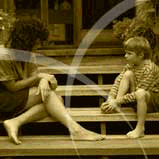Talking About Sex

When it comes to the birds and the bees, children need to learn that sexuality is about more than anatomy it s also about morality. The emotional aspect of sex is much more complex than the physical. Going from thinking the opposite gender has cooties to understanding why adults would want to have sex is a huge leap for kids. Since sexual information is abundant from media, friends, school and parents moral views are diverse. Ideally, parents should be the first to explain sex. Starting early, sharing age-appropriate information and explaining physical changes are crucial to healthy sexual development. Parents should also carefully review the school s sex education curriculum. Talking about sex with your kids may be uncomfortable, but it s crucial. Your discussions are the foundation for good sexual choices in your child s future.
Background Information
Having "The Talk"
It might be awkward, but it's a parent's place to talk about sex.
How Much is Too Much?
Here are age-appropriate guidelines for teaching kids about sex.
Questions and Answers
When do children begin to develop a sexual nature?
Answer
I really want my daughter to enjoy the Valentine season, but how can I help her see past the worldly exploitation of romance?
Answer
I would like to teach my own child about human sexuality, but I'm not sure I know how to go about it. When do I say what?
Answer
In a culture where dating and sex often blend together, where do I tell my son to "draw the line" physically?
Answer
Is sexual experimentation normal? What should I do if I catch my child acting out with another child?
Answer
Stories

Share Your Story
Other Things to Consider
When It Comes to Sex, Character Counts
Teaching character can make a difference in your child's future sex life.
Transitions: Having a Baby, Preparing for Adolescence
Life Pressures: Working Moms, Stay-At-Home Moms, Time for Family
Relationships: Parents and Adult Children, Blended Families
